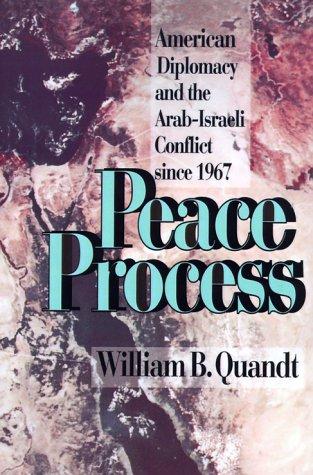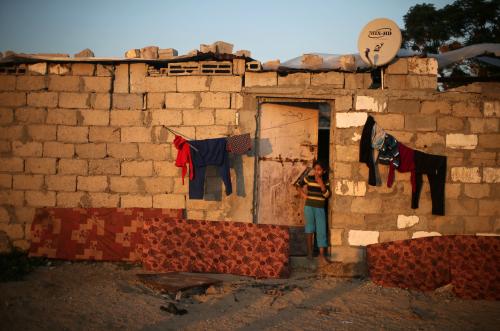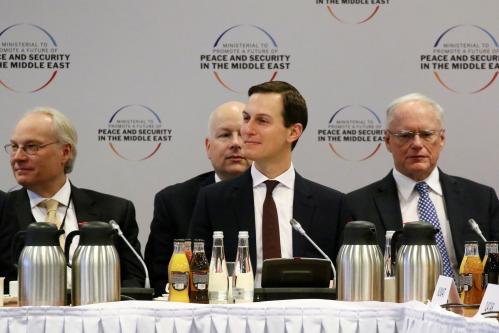The Palestinian Authority can and should implement a vision involving an education system where students master not only science, math, and the humanities, writes Hady Amr, but also deepen critical thinking skills, embrace a culture of inclusion, internalize entrepreneurship, learn how to work effectively in groups, and get exposure to the workforce. This piece originally appeared in The Hill.
At the joint White House press conference last week Israeli Prime Minister Netanyahu stated that one of the two reasons Israel cannot reach a peace deal is incitement, that Palestinians “continue to call for Israel’s destruction inside their schools, inside their mosques, inside their textbooks.”
And President Trump doubled down, stating, “The Palestinians have to get rid of some of the hate that they are taught from a very young age…I’ve seen what they are taught…And it starts in the school room.”
So what’s the story here? Are these age-old animosities ever going to go away?
Here’s the rub: The problem of incitement is indeed persistent. Although the Palestinian Authority has tried to tackle it, the situation is far from perfect. The sad truth is that whatever the existing agreements say, the full acceptance of the legitimacy by Israelis and Palestinians of one another will likely only come once a final agreement is reached. Unfortunately, no matter whatever any of us may want, not before.
So is there a way we can all work together to resolve this problem? Many believe there is. For starters, the Israelis and Palestinians badly need a referee here. And America can play that role.
In the 1990s there was a trilateral American-Israeli-Palestinian committee that monitored incitement to violence. That committee can and should be reestablished.
With that in place, the Palestinian Authority could agree to embrace this problem once and for all, in a manner than can no longer be questioned.
The Palestinians would likely defend their record by saying that they have already conducted considerable reform in this regard and that studies, including a multi-year study funded by the U.S. Government have shown that incitement has largely been removed from the Palestinian Authority education curriculum.
The Palestinians could also point out that although Israel prefers that its own curriculum be taught in Jerusalem, Israel does allow the Palestinian Authority curriculum and text books (with amendments) to be used in the majority of Arab schools in Jerusalem.
But Israel does have a legitimate basis for concern because problems do persist especially when tensions are high—when violence erupts on the West Bank or war breaks out with Gaza—imperfect teachers and students inject hateful statements into classrooms or social media. There’s absolutely no excuse for this behavior, but it’s important to understand how it comes about, if it’s going to be tackled.
So what the Palestinian Authority can and should to do is implement a vision where it has an education system that is among the best in the world, where students master not only science, math, and the humanities, but also deepen deep critical thinking skills, embrace a culture of inclusion, internalize entrepreneurship, learn how to work effectively in groups, and get exposure to the workforce. In fact, a program like this should be the aspiration of any nation on earth.
It would not be easy, but it could be built around the following pillars:
First, develop programs to allow students to undertake inter-school, and international cooperation to help make them global citizens that can succeed in a modern knowledge-based economy. And in doing so, transform curriculua to further integrate a culture of peace, tolerance, and diversity.
Additionally, integrate technology into the classroom through both equipment upgrades and teacher-training on how to discern fact from spurious information. American technology companies—like Apple, Facebook, Google, and Microsoft—could devote their incredible talents to help devise solutions.
Second, undertake curriculum reform to advance critical thinking, reading, math, and problem-solving skills, with a focus on elementary grades. And work with both academic and vocational high schools to integrate life skills and entrepreneurship training. Meanwhile, ensure that almost every school has enticing science laboratories.
Third, strengthen parent and community involvement in the education system. Keep class sizes manageable. And ensure that the physical infrastructure is attractive.
The good news is, the Palestinian Authority had already embraced much of this vision in theory. It just needs more help implementing it.
Now here’s where Israel comes it. Israel could more fully acknowledge that its own society has imperfections too. Just as partisan vitriol and hatred of the other has become a problem in America, Israel itself has not been immune.
Israel could also embrace the paradigm that although they will continue to work with the Palestinian Authority towards an elimination of incitement today, true success—and the fuller acceptance by Israelis and Palestinians of one another—will unfortunately only come through the conclusion and implementation of a fair peace deal.
A key challenge, though, is that the Palestinian Authority has no control over Gaza where Hamas rules, and so those schools are probably off the table until such a time as the West Bank and Gaza are reintegrated. But if we are going to allow Hamas to hold the peace process hostage through education reform, then the entire notion of peace is untenable.
In fact, it could be argued that making Palestinian schools in the West Bank the envy of the Arab world will only entice those in Gaza to finally dump Hamas, in turn further contributing to peace.
Where would the money come from and how much would be needed?
Whatever the source, imagine if an amount that is three percent of the $3.8 billion per year that President Obama committed to Israel in a 2016 deal for security were spent on this. That’s about what might be needed—$100 million per year. Indeed, wouldn’t these kinds of improvements to the Palestinian education system strengthen Israel’s security?
If President Trump truly wants to make the deal of the century, he’ll need to remove the stated impediments to that deal. Some may argue that this is naïve, but there is little to lose and everything to gain: The Palestinians would get better schools, Israelis would see incitement further erased, and we would all have clearer path to peace.
The Brookings Institution is committed to quality, independence, and impact.
We are supported by a diverse array of funders. In line with our values and policies, each Brookings publication represents the sole views of its author(s).











Commentary
How Palestinian schools can take Israel and the region closer to peace
February 23, 2017